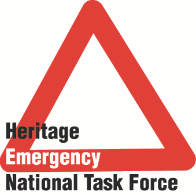 From the Heritage Emergency National Task Force
From the Heritage Emergency National Task Force
August 24, 2017—According to the National Hurricane Center, tropical storm Harvey's remnant is forecast to regain tropical cyclone strength in the next day or two. Once Harvey starts affecting the Texas coast, up to ten inches of rain will be possible over the next week. The system is expected to bring prolonged periods of heavy rainfall and flooding across portions of Texas and southwest Louisiana. There is the potential for storm surge and tropical-storm or hurricane-force winds across portions of the Texas coast from Friday through the weekend.
Be Prepared!
As Harvey approaches Texas and Louisiana, it’s important that individuals and cultural institutions in these states prepare:
- Gather your staff and review your disaster plan today. No disaster plan? Put that at the top of the to-do list once the storm passes (and hope you didn’t need it this time).
- If you have a disaster plan, make sure everyone has a printed copy to take home. An electronic version may be useless if you lose power.
- Make sure staff, volunteer, and board contact lists are up to date. Determine how you will communicate with one another before, during, and after the storm.
- Make sure your insurance and disaster recovery vendor contact information is readily available.
- Back up electronic records and store the back-ups off-site or in the cloud.
- Secure outdoor furniture, bike racks, book drops, signage, etc. – anything that can become a projectile in strong winds.
- Move collections that are in areas vulnerable to flooding (i.e., the floor, the basement) or susceptible to rain (near windows or under roofs) out of harm’s way.
- If you have time, cut lengths of plastic sheeting to be able to throw them over shelves, cabinets, or equipment should the building envelope be compromised.
- Know the location and shut-off procedures for water, electricity, and gas.
- Review individual or family plans. You’ll feel better attending to your organization knowing that your loved ones are safe.
Resources
- Download the FEMA mobile app for disaster resources, weather alerts, and safety tips. The app (available in English and Spanish) provides a customizable checklist of emergency supplies, maps of open shelters and recovery centers, disaster survival tips, and weather alerts from the National Weather Service. The app also enables users to receive push notifications reminding them to take important steps to prepare their homes and families for disasters. https://www.fema.gov/mobile-app
- Keep this 24/7 hotline number handy: 202.661.8068. The National Heritage Responders, a team of trained conservators and collections care professionals administered by the Foundation of the American Institute for Conservation, are available 24/7 to provide advice.
 From the Heritage Emergency National Task Force
From the Heritage Emergency National Task Force